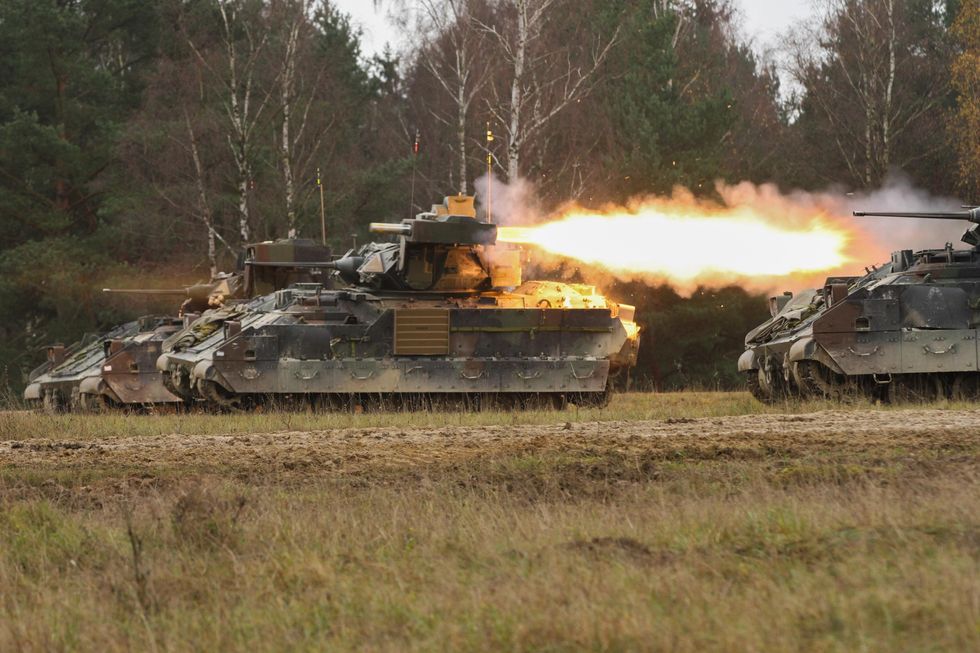
A Russian official this week responded to the Biden administration’s refusal to rule out sending depleted uranium anti-tank munitions to Ukraine by warning that deployment of such weapons—which have been linked to birth defects, miscarriages, and cancer—would be regarded by Moscow as use of “dirty nuclear bombs.”
According to a White House transcript published after a Wednesday press call, an unnamed senior Biden administration official would not say when a reporter repeatedly asked whether the United States would provide armor-piercing depleted uranium (DU) ammunition for the Bradley Fighting Vehicles that are part of a recently announced $2.85 billion aid package to Ukraine. The Bradleys, as well as the U.S. Abrams and German Leopard tanks and Marder infantry fighting vehicles Ukraine is set to receive, can fire armor-piercing shells with uranium cores.
The official also declined to say whether the M1 Abrams main battle tanks the administration said it will send to Ukraine will be of the older M1A1 variety or the newer M1A2, which is equipped with DU armor. Citing “three people with knowledge of the deliberations,” Politicoreported Thursday that the U.S. will deliver 31 M1A2 Abrams tanks—but without DU armor.
“We know that Leopard 2 tanks, as well as Bradley and Marder armored fighting vehicles, can use depleted uranium shells, which can contaminate terrain, just like it happened in Yugoslavia and Iraq.”
“We know that Leopard 2 tanks, as well as Bradley and Marder armored fighting vehicles, can use depleted uranium shells, which can contaminate terrain, just like it happened in Yugoslavia and Iraq,” Konstantin Gavrilov, head of the Russian delegation to the Vienna Negotiations on Military Security and Arms Control, said at an Organization for Security and Cooperation in Europe meeting on Wednesday. “If Kyiv were to be supplied with such munitions for the use in Western heavy military hardware, we would regard it as the use of ‘dirty nuclear bombs’ against Russia, with all the consequences that entails.”
Garilov also warned of grave consequences should Ukraine’s backers supply it with more long-range weapons.
“If Washington and NATO countries provide Kyiv with weapons for striking against the cities deep inside the Russian territory and for attempting to seize our constitutionally affirmed territories, it would force Moscow to undertake harsh retaliatory actions,” he said. “Do not say that we did not warn you.”
Russian officials including President Vladimir Putin have repeatedly threatened Ukraine’s Western allies with nuclear retaliation for perceived escalations.
Fired from tanks, planes, helicopters, and artillery, DU rounds are extremely dense and ideal for piercing hardened armor. However, exploding DU shells release radioactive dust particles that linger in the soil, water, food, and air for many years. While the Pentagon publicly states that DU is not known to cause any harm, an Army training manual warns that “contamination will make food and water unsafe for consumption” and requires soldiers coming within 80 feet of DU-contaminated material to wear protective clothing.
U.S. and allied forces relied heavily upon DU munitions during the 1991 and 2003-11 invasions of Iraq. In a situation reminiscent of the Agent Orange crisis in Vietnam, miscarriages, birth defects, and cancers soared in Iraq after both wars. One study found that more than half of the babies born in Fallujah between 2007 and 2010 had birth defects. Among the pregnant woman surveyed in the study, more than 45% experienced miscarriages in the two-year period following the U.S. assaults on Fallujah. Geiger counter readings of DU-contaminated sites in densely populated Iraqi urban areas have consistently shown radiation levels that are 1,000 to 1,900 times higher than normal.
DU rounds used by the U.S.-led NATO coalition during the 1999 air war against Yugoslavia are also believed to have caused a surge in leukemia in the region—both among the local population and foreign troops deployed there. Researchers and veterans groups also believe DU could be the cause of the mysterious Gulf War Syndrome afflicting hundreds of thousands of U.S. and coalition troops, although in 2021 the Pentagon concluded there is “no link” between the illness and DU.
In 2017, a U.S. military commander admitted that thousands of DU rounds were fired during attacks on Islamic State militants in Syria.
According to the International Campaign to Ban Uranium Weapons, the arsenals of at least 15 nations contain DU munitions.
Last year, the United Nations General Assembly approved a draft resolution submitted by Indonesia expressing concerns about “the health risks and environmental impact” of DU weapons and calling for a “cautionary approach” to their use. The vote was 147 to 4—the U.S., U.K., France, and Israel—with 24 abstentions.




